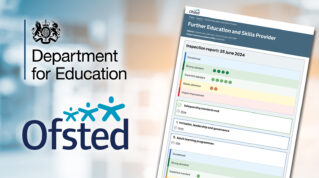Ofsted chief inspector Sir Martyn Oliver talks to FE Week senior reporter Josh Mellor about the next inspection framework and why accountability measures in further education (FE) mean it’s complicated to “unpick” one-word judgements.
Q: At last week’s Confederation of School Trusts conference you said some school leaders were “putting pressure on inspectors and making the inspection process more adversarial”. Have you seen the same issue in FE?
A: No – I’ve been really clear with my staff that they should be professional, courteous, empathetic and respectful, and I wouldn’t expect any one of our staff to deliver a standard less than that. I expect and hope that we receive that in return.
If I look holistically across all of the 97,000 providers we inspect, where we see the greatest challenge more recently is in the multi-academy trust world where sometimes the tension between a headteacher and an executive can lead to a heightened dynamic on inspection.
But in colleges, we find a much more collaborative, cooperative inspection model. In FE it’s really quite empowering to see the nominee on an inspection who I think is the bridge between the inspectors and the inspected.
Something I’m thinking about is: is that something I should consider for other remits? It helps us significantly with the professional relationship we have in FE.
Q: So FE provider inspections are less adversarial despite the fact that the stakes are higher due to one-word judgments still being in place, unlike for schools?
A: It’s something that we’re committed to removing. It’s just that in state schools, the law, the Education and Inspections Act 2006, still requires Ofsted to identify an acceptable, and therefore an unacceptable, standard of education, and schools that are in special measures and require significant improvement – we call it serious weaknesses.
Despite the removal of the single-word judgment, the law requires us to make that decision and the law isn’t changing at the moment.
Now, in the FE world, it’s in the contract as well as intervention from the DfE and the regulator. So, unpicking the financial contract requires them to make a determination on the back of an Ofsted grade. That has to be worked out and can’t just be a unilateral decision because that would leave providers and the DfE unsure of what to do if they had a poor inspection outcome.
Ofsted is working to develop an inspection framework which meets the needs of the sector but doesn’t thwart government in its right to develop a contract with FE and to intervene as the regulator.
Q: Data shows there hasn’t been an ‘inadequate’ report in FE since Ofsted dropped overall judgments for schools in September. Is that a coincidence or has there been a conscious decision to avoid giving the lowest grade internally?
A: No, we don’t do anything like that. We’re really pleased by the quality of what we see out in the FE world. It’s really encouraging, and so I’m delighted at the quality of consistency in our training. Our inspectors will find what they find.
No one is ever put under pressure to change a grade or to meet a quota. We have a clear, standard framework, which is consulted on.
Inspectors inspect against that framework. We quality assure their evidence gathering against the framework, their judgment is their judgment.
Q: Ofsted is set to consult on a new inspection framework next year – will there be a separate framework for FE?
A: My intent is to look at providing frameworks which meet the needs of individual remits, from early years through to FE and eventually children’s services and social care. The challenge, which we will want to talk about in the consultation, is do parents want to see a coherent system that they can easily understand?
I really want to focus on the links between different areas because I think we’ve become too compartmentalised.
Q: Report cards are due to be rolled out next September. Are they definitely going to happen for FE and skills?
A: Let’s be clear, the report card is something that the secretary of state has talked about. I’m talking about a report card inspection framework.
Now, whether or not the secretary of state and the Department for Education choose to add over time and build upon a minimum viable product to make the report card even more sophisticated, to provide more information to learners, to parents and to providers – I’m sure that’s something they will want to really think hard about.
















Your thoughts